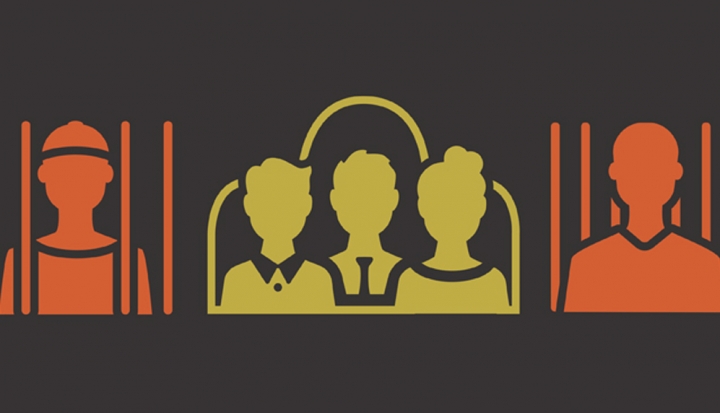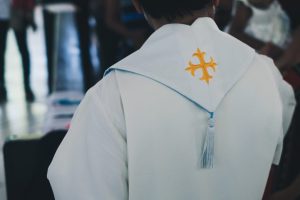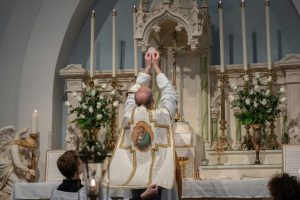Sam Middleton had already been in prison for 26 years when the letters started coming. One day he had a pile of five unopened envelopes, addressed to him from people he had never met. Each return address was from a family in his hometown of Bay View, Washington.
“It took me almost two weeks to open the first letter, I was that shocked,” says Middleton, who at the time was an inmate at the Stafford Creek Corrections Center in Grays Harbor County, Washington. “It was odd for me to start getting letters from the community I was going back to. Nobody had written me for the last 25 years, and I was worried. Were they saying, ‘Please go anywhere but this town’? Did they just not want me to come back?”
Middleton soon realized his fears were off base. The letter writers were all members of his mother’s church, Bay View United Methodist, and were offering friendship and support. As Middleton began to respond, more people from the church started reaching out. By the time he left prison in October 2016, Middleton had a card stored in his wallet that he jokingly refers to as “Sam’s Uber.”
“I had this card with about 17 names on it, just anyone I could call who was willing to drive me anywhere or to sit down and talk to me, people there to help me get back and reacquainted,” he says. “It was really comforting to know that as I got close to the door, I wasn’t facing a rugged landing.”
It was only later that Middleton began to understand what had inspired the sudden surge of support. Earlier that year the congregation hosted a guest presentation from Chris Hoke, founder of Underground Ministries, an organization that works to support gang-affected prisoners as they reenter society.
During the talk Hoke told the audience that, in the state of Washington at that time, there were roughly the same number of prisoners as churches. Hoke’s idea was that each parish should take steps to adopt one particular prisoner and offer support to help them readjust to society upon their release.
“Chris told them to write to me,” Middleton says. “It was kind of nice to have people in communication with me who weren’t like, ‘What have you done?’ Instead it was, ‘You’re coming out. How can we help you get started again?’ ”
Since hearing about the success of Middleton’s relationship with the Bay View congregation, Hoke has teamed up with Joe Cotton, director of pastoral care for the Archdiocese of Seattle, to bring what they call the One Parish, One Prisoner (OPOP) initiative to more churches. In 2016 the team—which also includes Neaners Garcia, a formerly incarcerated gang leader turned minister—launched a pilot effort at three Seattle-area churches.
At each location, the team coached congregations on how to select a few stakeholders who could take the lead in writing to the person in prison, visiting, and reporting back to the community. The team also led each congregation through an OPOP orientation series to teach them about prison and the uphill battle many ex-convicts face as they work to rebuild their lives.
Saddled with a criminal record, people coming out of prison have difficulty being approved for jobs or apartment rentals. They usually have unpaid debts from prior legal fees or fines. Some struggle with mental health issues or addictions.
When Middleton left prison, he faced a long string of bureaucratic challenges, including opening bank accounts, paying old fines, getting health care, finding a place to live, getting his driver’s license, and applying for financial aid to go back to school.
“After 27 years I had never seen the internet, I didn’t have a cell phone, I had to start from ground zero,” he says.
The biggest challenge was finding work.
“I had been driving a forklift in prison for 14 years and drove it on the street before for five years, but I couldn’t even get hired in the warehouse at Goodwill,” Middleton says. “I thought, ‘If Goodwill won’t even hire me, how am I supposed to get a job?’ ”
Eventually Hoke was able to help, giving Middleton a position as a coffee roaster for Underground Coffee, a company that provides gateway employment opportunities for men and women exiting the legal system. Middleton loves his job and knows he is lucky he had a community to help him. For many prisoners, obstacles like the ones he faced would be too overwhelming to tackle alone.
“It’s great to have people with you so you can hit these roadblocks straight on instead of trying to go around them,” he says.
Supporting people such as Middleton is exactly what Hoke says the OPOP initiative is all about. Hoke is well aware of our country’s recidivism rates, where an estimated two thirds of people released from prison end up getting arrested again within three years. With a little help from a supportive community, he hopes new people being released can find more success getting their lives back in order.
“It’s not just about writing letters, but about building trust,” Hoke says. “We hope that when these people get out, there’s a real sense of homecoming and they have a community and trusted relationships they can lean on through that process.”
Unexpected challenges
For one of the first pilot OPOP initiatives, Cotton reached out to St. Joseph Parish in Seattle. There he worked with Deacon Steve Wodzanowski, pastoral associate, to set up a stakeholder team. The parish was partnered with Jorge (his name has been changed to protect his privacy), an inmate at the Monroe Correctional Complex who was in his mid-20s and approaching the end of a 10-year prison sentence.
Wodzanowski, who had previously spent time working in hospital ministries, says he was interested in OPOP because he enjoys working with people on the margins of society.
“Living in Seattle, a lot of these prisons are out of sight, out of mind. They’re not really close to where we live and work,” he says. “As Catholics, we’re against certain things by principle, but this shows we’ve got skin in the game and that we want to get involved in real issues.”
Building a relationship with Jorge turned out to be more difficult than Wodzanowski and his team of stakeholders expected. One of the toughest parts early on was convincing Jorge to trust them.
“It took a while to get over the hump of, ‘What do you want from me? Are you trying to save me?’ ” Wodzanowski says. “A lot of it came down to communication, whether it meant visiting, checking in with him, or just providing a different voice than the one he hears in the system that is so negative.”
Another challenge came when, soon after the group began corresponding with Jorge, he was moved to a prison nearly 300 miles away on the other side of the state. After that, trips to visit him became full-day commitments, with a three-hour drive and a ferry ride each way. At first the St. Joseph team was disappointed, but then they organized carpools to make the drive.
“Now we had this former gang member scratching his head like, ‘Why are these people coming to see me?’ ” Cotton says. “It became this opportunity for them to really show him love. It made him realize that love was available.”
St. Joseph parishioner Leslie Overland was part of the OPOP team reaching out to Jorge. Having never met anyone in prison, she was initially worried about what to say to Jorge.
“The first intimidating thing was writing that first letter,” she says. “My life is so boring. What could I say that would make him want to talk to me? How much of this is gonna come off as, ‘Here I am, this privileged white person talking about things you don’t want to hear’?”
Slowly but surely, she and Jorge were able to build a real friendship. He told her about the classes he was taking and books he was reading. She shared photos from weekend trips or other things happening in her life. The first time she went and visited him, they talked through an entire three-hour visitor period.
“That conversation was so wonderful. I just remember how fun it was to learn about him and what he was involved with in the prison,” she says. “He was sent to prison very young, at maybe 16 or 17 years old. I can’t imagine what it would be like to be 17 and cut off from your friends and family as you’re learning to be an adult. I was just so amazed at how delightful he was and still is.”
Jorge also talked about his goal of helping younger people make good life decisions. “He’s really eager to help them intercept where the path might be leading them the wrong way,” Overland says. “He’s in a unique position to be able to mentor and influence young people. It’s a really big desire of his.”
Unfortunately, Jorge’s release plans were altered when the Department of Homeland Security put a hold on his case. Although his prison sentence is complete, Jorge is now being held in an ICE-partnered private detention facility in Tacoma, Washington, where he faces possible deportation. The St. Joseph parish group continues to visit him and has used its contacts to connect him with an immigration attorney.
“When he has an immigration hearing, we’re hoping to bring a lot of people out to the courtroom to say, ‘We know this guy and we’re paying attention to what you’re doing,’ ” Wodzanowski says. “We want to show that he has support, he has connections.”
Being involved in an OPOP partnership has been an eye-opening experience for Overland. She’s grateful for her friendship with Jorge and everything he has taught her, and she’s also more acutely aware of how society treats the poor and marginalized.
“We have such a throwaway society in so many ways, where we lock people up for 30 years and see that as a victory,” she says. “How can we call ourselves a free nation when we just pack these people up and throw them away?”
Wodzanowski has been similarly moved. After getting involved in an OPOP initiative, he felt motivated to do additional prison ministry work on his own. Now he visits prisons every other week, often bringing guests with him.
“This gives me a lot of faith,” he says. “These are people who have done some bad things, of course, but they’ve figured it out and now they want to get out and get back to their families. Sometimes in ministry you can get frustrated with what’s going on, but it always comes down to building real relationships and helping one person at a time.”
Relationships that transform
In preparing churches to enter OPOP relationships, Hoke and Cotton stress the idea that happy endings aren’t guaranteed. They know that parish communities might enter the ministry expecting positive and inspirational experiences. The reality, Cotton says, is always more complicated.
“People can slip into this mind-set where, ‘We’re the saviors and this is the person we’re
saving,’ and then this idea begins to form that they’re going to enter into this person’s life and everyone will live happily ever after,” he says.
“The challenge exists in the fact that that’s probably not how it’s all going to unfold. This person may relapse, they may get themselves into trouble again, or the community might not love them in the best way possible. There will be times when everything is going great and we’re all high-fiving each other and other moments where everything is going to hell.”
Hoke often refers to the story of Lazarus, in which Jesus asks the community to participate in Lazarus’ resurrection by rolling away the stone blocking the dead man’s tomb.
In today’s society, Hoke says, prisoners are like Lazarus—trapped in cells and locked away. It is only when others can help move the barriers to reentry that they can be resurrected to a new beginning.
“We tell people, ‘You are the community called to roll away the stone and you get to be a part of that,’ ” he says. But, continuing the metaphor, “When you roll away a stone from a tomb, it’s gonna stink in there. That shows that there will be problems, there could be safety concerns or hurt feelings and disappointments.”
By opening themselves up to relationships with people in prison, Hoke says church members will come face to face with the defense mechanisms of others, including misogyny, gang identities, trust issues, or rage. At the same time, they’ll encounter their own fears and prejudices.
Cotton remembers one female participant who said she would always avoid a certain entrance at her local grocery store because she was intimidated by the gang members who stood nearby. After becoming friends with a former gang member through an OPOP partnership, the woman said she was no longer afraid to walk by that group or even greet them.
“The opposite of love is not hate, the opposite of love is fear. It’s only once fear is out of the equation that we’re capable of loving,” says Cotton. “By entering into these relationships and developing a true knowledge of one person, people can soften their hearts and will be able to extend that compassion to others.”
In another OPOP partnership, the person partnered with a parish was released from prison and greeted warmly by the community. Then he disappeared a few weeks later.
Watching the heartbreak of the parish community, Hoke felt like he had failed for bringing them into this man’s struggles. It was only later that he realized the beauty in their connection.
“Here’s a church that is heartbroken because a gang member who used to sell meth is gone,” he says. “If a church is having its heart broken because they love someone in the underground, and these ladies are driving around town looking for him, then they’re thinking about prison differently. What if all churches were like that, driving around looking for the people who are lost?”
That experience, though unpleasant, changed the way both Hoke and Cotton think about the OPOP initiative. “Heartbreaks happen,” Hoke says. But he also knows that relationships transform.
“The ultimate purpose of this is to try to make the world look closer to the kingdom of God,” says Cotton. “The thought of senior women driving around looking for a lost gang member? That feels heavenly to me.”
Resurrection work
After learning from the successes and complications of the pilot initiative, the Underground Ministries team is now working to establish several new OPOP partnerships in Washington. Hoke has also developed a series of web-based tools that parishes can use to structure stakeholder meetings. On his website, undergroundministries.org, he hopes to have resource lists and a modeling framework that other organizations can use to begin similar efforts.
“We’re hoping that this will allow us to grow in Washington more quickly and that churches can start to practice this online and find their way,” he says.
For the new round of OPOP partnerships, the team has selected prisoners to participate through an application process. Now they’re approaching parishes in the communities to which those men and women will return.
One of the first people to sign up for the new round was Ruben, a prisoner at the Twin Rivers Unit, part of the Monroe Correctional Complex in Monroe, Washington. In prison since 2013, Ruben is working his way through a 10-year sentence for armed robbery, which he says was the result of a 25-year drug addiction.
After spending time in solitary confinement several years ago, Ruben had a change in perspective about his life. His daughter came to visit during that period and was disappointed when she couldn’t hold his hand.
“After that, I decided I was going to do everything in my power to get out of here and stay out,” he says. “I had this spiritual awakening and started reading the Bible. God came into my life. I’m very grateful for having this second chance at life. I realize I’m alive and I could have been dead a long time ago.”
Today Ruben participates in recovery groups and mentors ex-gang members. Passionate about his Catholic faith, he was confirmed earlier this year. He is excited to partner with a parish in his hometown and hopes it will be the beginning of a better life. What he wants to find is more than simply job connections or apartment referrals. What he really needs, he says, is a community.
“I don’t want to go back to my old friends and the places I was hanging out. I don’t want to do the same things I used to do,” he says. “I need to learn new things as part of my recovery and I need to make new friends.”
Cotton says he is optimistic that the OPOP initiative will continue to help people like Ruben, because churches are already “rooted in the values of reconciliation and redemption.”
“We sit in the church pews and hear about resurrection all the time, but what does it actually mean to live that out in a real way?” he asks. “This goes beyond metaphor and story. Here we’re actually participating in Christian resurrection through action.”
This article also appears in the January 2020 issue of U.S. Catholic (Vol. 85, No. 1, pages 12–17). Click here to subscribe to the magazine.














Add comment